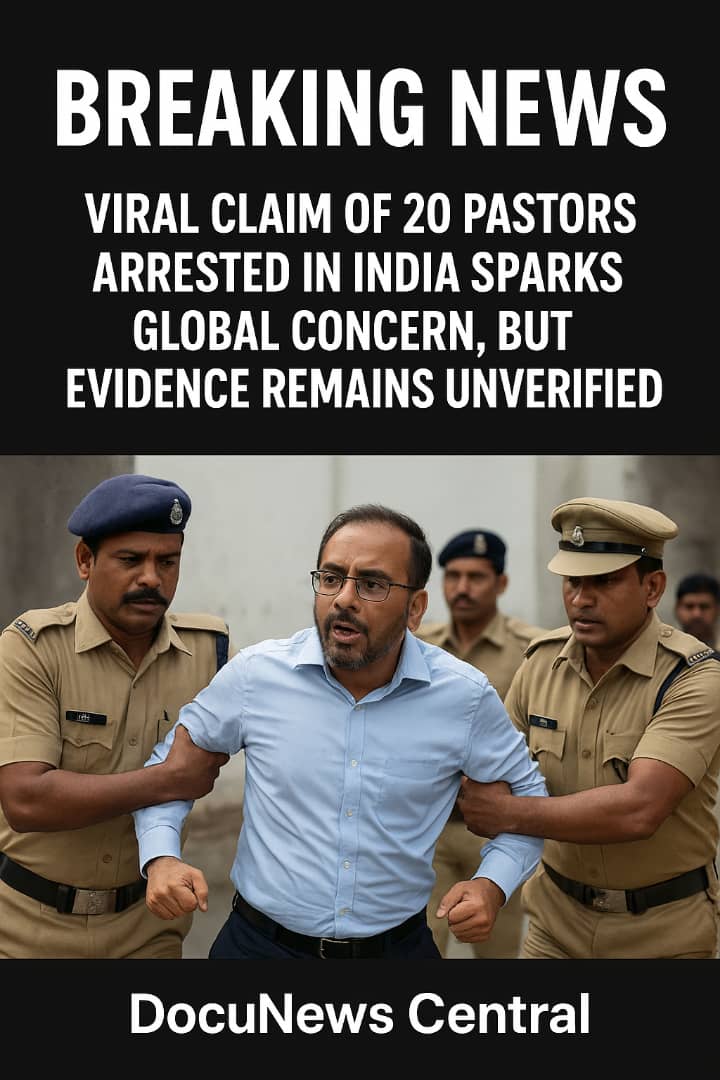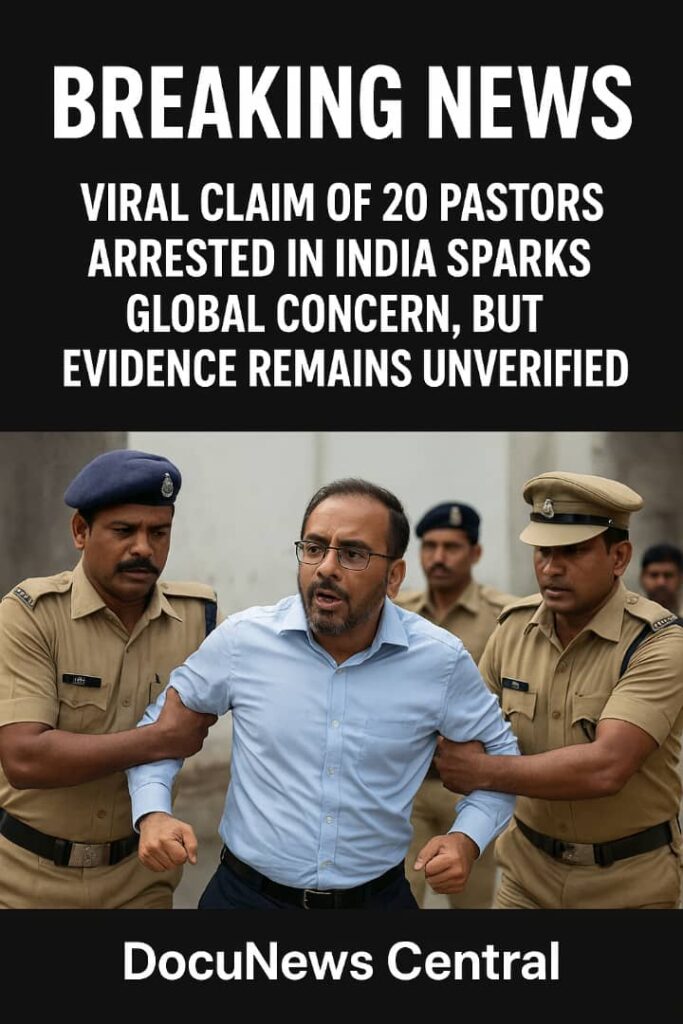

BREAKING NEWS: Viral Claim of 20 Pastors Arrested in India Sparks Global Concern, But Evidence Remains Unverified
By DocuNews Central – Special Report
Viral Claim That Sparked Concern
In recent days, a social media post spread rapidly across multiple platforms claiming that twenty pastors and church leaders were arrested in India for preaching Jesus. The post carried alarming language, urging global Christians to pray for Indian churches. It alleged that life imprisonment is now the penalty for sharing the Gospel.
The statement was widely shared, triggering panic among believers worldwide. Yet, after detailed investigation, no credible evidence supports this exact claim. No mainstream Indian or international media outlet has confirmed the mass arrest of 20 pastors on a single day for preaching. What emerges instead is a more complex picture — one involving new anti-conversion laws, scattered arrests, and online exaggeration.
What Indian Law Actually Says About Preaching
India’s Constitution guarantees freedom of religion. Article 25 allows all individuals to profess, practice, and propagate their faith. In principle, this provision protects the right to preach and share beliefs.
However, several states have passed “anti-conversion laws” designed to curb forced or fraudulent religious conversions. These statutes criminalize conversions through coercion, inducement, deception, or marriage with intent to convert.
While supporters argue that such laws protect vulnerable communities, critics say they restrict free expression and can be misused. Importantly, the laws do not directly criminalize peaceful preaching. Sharing faith, without coercion, remains legal under the Constitution.
Anti-Conversion Laws and Life Imprisonment Explained
The controversy grows because amendments in certain states now prescribe severe penalties. In Uttar Pradesh and other states, maximum sentences can include life imprisonment in aggravated cases — for example, if conversions involve minors, women, Scheduled Castes, or Scheduled Tribes, or if coercion is proven.
This detail is often misunderstood online. Life imprisonment is not the punishment for preaching; it is a penalty for specific types of unlawful conversion. Still, the presence of such harsh penalties fuels fear and confusion, especially when arrests occur.
Documented Arrests of Pastors in 2024–2025
Although the viral claim about 20 pastors remains unverified, there have been several confirmed incidents of pastors and church workers arrested under anti-conversion laws:
July 2025 (Bhilai, Chhattisgarh): Six pastors were arrested after a mob disrupted a church service. Reports alleged that some detainees suffered assault in custody.
Early 2025 (Uttar Pradesh): A Christian couple was sentenced to five years in prison for allegedly converting Dalits through inducement. This was the first conviction under the amended UP law.
Various districts in Uttar Pradesh and Madhya Pradesh (2024–2025): Several pastors faced charges, with police filing First Information Reports (FIRs) based on complaints of illegal conversions.
September 2025: Seven Christians in UP were arrested for holding Sunday services, accused under conversion regulations.
These cases demonstrate a pattern of arrests, though none match the viral claim of 20 leaders taken on a single day purely for preaching.
Why the “20 Pastors Arrested Yesterday” Story Spread
The viral story fits a familiar cycle. Laws with severe punishments create anxiety. Real arrests of pastors and believers feed the narrative. Social media then amplifies half-truths or exaggerated claims.
The number “20” seems to have gained traction because multiple smaller arrests are sometimes bundled together in online retellings. Without clear sourcing, the claim spreads as fact. Language barriers also play a role: local Hindi or regional news reports, when translated or summarized, can morph into exaggerated versions.
Local and Global Reactions
Church leaders across India report heightened fear. Some pastors say they face harassment, summons, or police questioning. Congregations are more cautious about public gatherings.
Globally, Christian advocacy groups are sounding alarms. International human rights monitors warn that India’s anti-conversion laws may be used to target minorities unfairly. Churches abroad have called for prayer, lobbying, and diplomatic attention.
At the same time, Indian government representatives defend the laws as safeguards against exploitation, insisting that lawful religious activity remains protected.
Digital Amplification and the Role of Social Media
Social platforms act as accelerators. Posts with dramatic numbers and emotional appeals generate clicks and shares. Hashtags like “PrayForIndia” trend easily, drawing global sympathy.
However, fact-checkers highlight that such posts often omit details like location, date, or police confirmation. Once shared widely, corrections struggle to reach the same audience. The case of the “20 pastors arrested yesterday” fits this pattern: unverifiable but viral.
Legal Challenges and Court Reviews
Several anti-conversion laws are facing judicial scrutiny. In September 2025, India’s Supreme Court directed multiple states to respond to petitions seeking stays on these laws. Petitioners argue that the statutes infringe constitutional freedoms.
Courts in Uttar Pradesh and Madhya Pradesh have already heard individual bail applications and appeals related to these arrests. Some pastors remain detained pending trial, while others have been released on conditions. The legal battle continues, shaping the boundaries between faith practice and state regulation.
How Christians in India Are Responding
Indian churches are adopting mixed strategies. Some continue worship boldly, citing constitutional rights. Others adapt by meeting in smaller groups or avoiding overt evangelism.
Faith-based NGOs are providing legal aid, documenting incidents, and filing petitions. Senior church leaders emphasize peace and lawful defense, urging congregations not to respond with hostility. Many call for unity and resilience, stressing that persecution narratives must be grounded in verified facts to maintain credibility.
How Readers Can Verify Such Claims
Given the frequency of exaggerated posts, readers must approach such claims with caution. Practical steps include:
Look for details: credible reports mention locations, police statements, or FIR numbers.
Cross-check sources: see if multiple reliable outlets carry the same story.
Watch the dates: sometimes older incidents are recycled as new.
Be wary of round numbers: viral claims often use neat figures like “20 pastors” without evidence.
Consult fact-checkers: organizations regularly investigate such stories.
By applying these checks, readers can distinguish between genuine incidents and unverified rumors.
Conclusion: Separating Facts From Fear
The viral claim that 20 pastors were arrested yesterday in India for preaching Jesus is unverified and likely inaccurate. What is true is that anti-conversion laws have grown harsher, arrests of pastors are occurring, and confusion over the legal landscape fuels fear.
Life imprisonment is a potential penalty only in cases of forced conversion under specific conditions, not for general preaching. Yet the existence of such punishments and the reality of smaller arrests create fertile ground for exaggerated online claims.
As India’s courts review these laws, the tension between constitutional freedom and state regulation remains unresolved. The challenge for believers, advocates, and global observers is to respond with vigilance — but also with a commitment to verified truth over viral fear.








